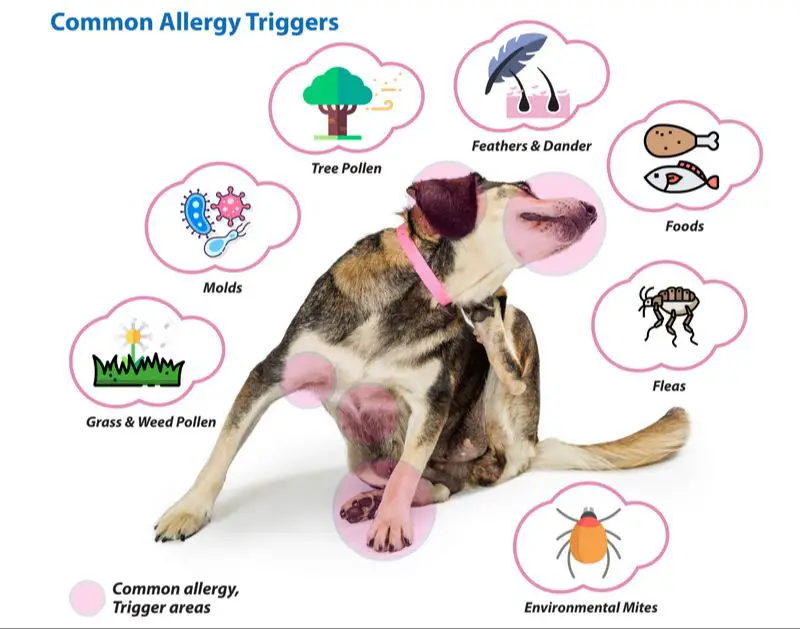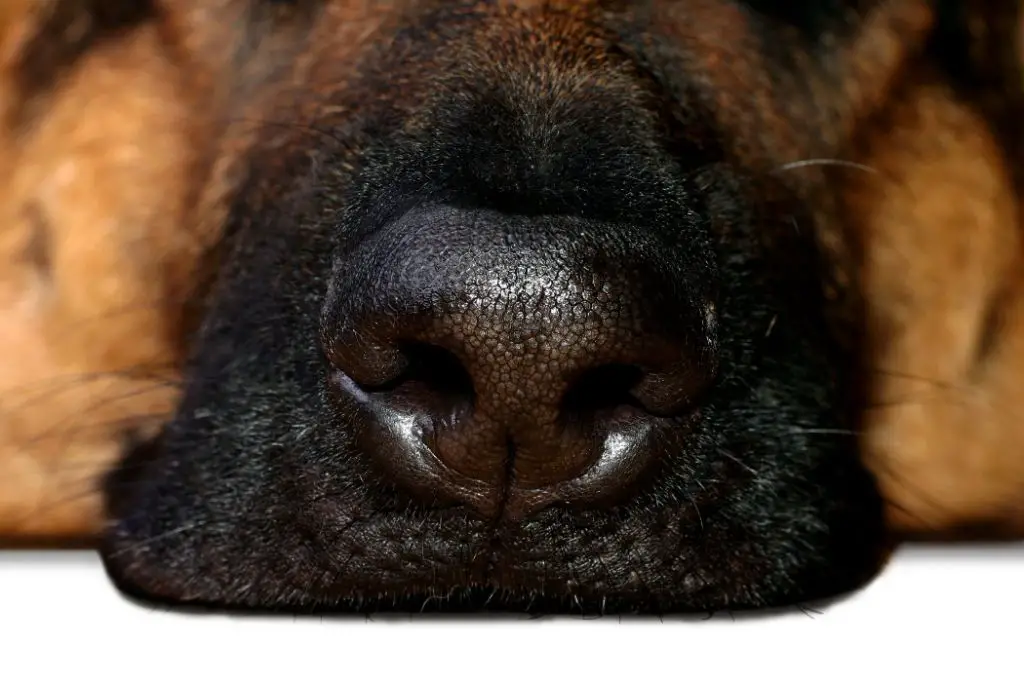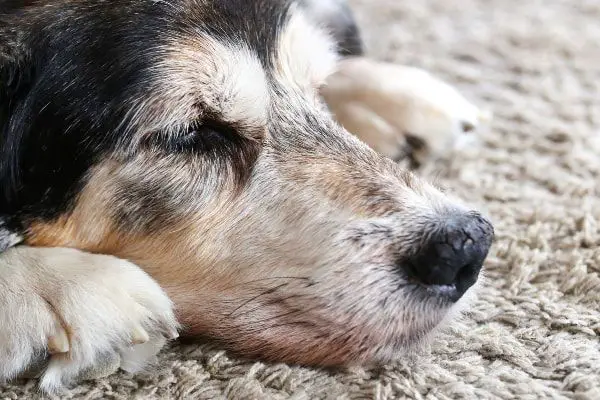Introduction
Nose twitching and spasms in dogs can be concerning for pet owners. A dog’s nose contains many sensory nerves and muscles that allow them to smell, breathe, and express themselves. When these nerves and muscles involuntarily contract, it can cause rapid twitching and quivering of the nose. This twitching is medically known as myokymia or fasciculation. While it may seem alarming, minor nose twitching is usually nothing to worry about in healthy dogs. However, frequent or intense twitching could potentially indicate underlying health issues that require veterinary attention.
Muscle Twitches
Muscle twitches and tics in dogs can occur for a variety of reasons. Some of the most common causes of muscle twitches and spasms include:
- Fatigue – Overexertion and tired muscles can develop twitches as they recover from strenuous activity.
- Stress – Anxiety, nervousness, and stress can cause muscles to twitch and tense up.
- Low Electrolytes – Imbalances of minerals like potassium and sodium often lead to muscle twitching.
- Nerve Disorders – Diseases affecting the nerves and neurotransmitters can result in uncontrollable muscle spasms.
If your dog is experiencing persistent muscle twitches, it’s a good idea to rule out any underlying health conditions. Vet examinations along with blood tests can determine if issues like electrolyte imbalances or neuromuscular diseases are causing the twitching.
Nasal Twitches
A dog’s nose may twitch for a variety of reasons. Here are some of the most common causes of nasal twitching in dogs:
Allergies – Dogs can have allergic reactions just like humans. Allergens like pollen, dust mites, mold, and dander can cause a dog’s nose to twitch and itch. The nasal passages become irritated and inflamed, leading to sneezing and twitching.

Foreign Objects – If a foreign object like a grass seed or foxtail gets lodged in a dog’s nostril, it can cause irritation and twitching as the dog tries to dislodge it by shaking its head. The irritation and discomfort lead to constant nose twitching.
Nasal Mites – Nasal mites are tiny parasites that can infest a dog’s nasal passages and sinuses. As the mites crawl around, they cause severe irritation resulting in scratching, sneezing, and nose twitching. Mites cause inflammation and fluid buildup that also contributes to twitching.
Pay attention to when your dog’s nose twitches to narrow down the potential causes. Keeping their environment clean and visiting the vet regularly can prevent issues like allergies and mites. Seek veterinary care if the twitching seems abnormal or excessive.
When to See a Vet
Should your dog’s nose twitching become frequent or persistent, it may be a sign of a more serious issue that requires veterinary attention. Be on the watch for other concerning symptoms that accompany the twitching such as sneezing, nasal discharge, rubbing at the nose, or changes in breathing. Frequent episodes of twitching that occur throughout the day are also a sign to have your dog checked out. This could indicate the presence of nasal mites, a foreign object lodged in the nasal passages, or a potentially severe infection or allergy.
A trip to the vet is also recommended if the twitching is accompanied by other neurological symptoms like seizures, balance issues, abnormal eye movements, or head tilting. Your vet can do a thorough physical exam and potentially order diagnostics like bloodwork, imaging, or allergy testing to get to the bottom of what’s causing your dog discomfort.
While occasional nose twitching is harmless in otherwise healthy dogs, recurring episodes or twitching along with other problems merit a veterinary visit. This will help get your dog the proper treatment to stop the twitching and address any underlying conditions.
Allergies
Nasal allergies are a very common cause of nose twitching and irritation in dogs. Allergies occur when the dog’s immune system overreacts to something in the environment that is normally harmless. This causes inflammation and irritation of the nasal passages. Some common allergy triggers include:
- Pollen – From trees, grasses, weeds etc.
- Dust mites
- Mold
- Perfumes and household chemicals
- Cigarette smoke
- Certain foods – Beef, chicken, corn, wheat etc.
Allergic reactions cause the nasal tissue to become swollen and inflamed. This irritation and inflammation can cause involuntary muscle twitches of the nose. It’s the body’s way of trying to get rid of the irritant. Allergy testing and medications from your vet can help identify and treat the underlying cause.
Foreign Objects
Dogs have a strong sense of smell and will often sniff and investigate objects in their environment. Unfortunately, this curiosity can sometimes cause them to inhale foreign objects into their nose. Some common foreign objects that may cause nasal twitching in dogs include:

-
Grass seeds – Grass seeds are small and easily inhaled into a dog’s nostrils where they can become lodged and cause irritation.
-
Foxtails – These bushy, bristled plant awns can work their way into the nose and cause pain and infection.
-
Sticks or wood splinters – Dogs who playfully chew on sticks may accidentally inhale wood pieces into their nasal passages.
-
Small stones or pebbles – While exploring outside, dogs may sniff and inhale tiny rocks into their nose.
-
Sand – At the beach or playground, sand can get swept into a dog’s nostrils by wind or as they dig and play in it.
-
Small toys or balls – Dogs who play fetch may accidentally suck tennis balls or other toys into their nasal cavity.
These foreign objects become trapped in the sensitive nasal tissues, causing irritation, inflammation, sneezing, and nose twitching. In severe cases, they may cause pain, infection, or abscesses. If a foreign object is inhaled, a veterinarian can use imaging techniques to locate it and may need to sedate the dog to remove it.
Nasal Mites
Nasal mites are microscopic parasites that can infect a dog’s nasal passages and sinuses. They are a common cause of nose twitching and other nasal symptoms in dogs.

The scientific name for the mite that most commonly causes nasal infections in dogs is Pneumonyssoides caninum. These mites thrive in the warm, moist environment inside the nasal passages. An infestation often starts when infected dogs spread the mites through direct contact.
Symptoms of nasal mites include:
- Nose twitching or repeated sneezing
- Nasal discharge that may be clear, yellow, green, or bloody
- Frantic pawing at the nose and face
- Head shaking and discomfort
- Reverse sneezing episodes
Nasal mite infestations can be diagnosed through a vet exam and laboratory analysis of nasal samples. Treatment typically involves antiparasitic medications, antibiotics, antihistamines, and nose flushes.
Ivermectin, milbemycin, or moxidectin are commonly prescribed oral medications to kill nasal mites. Antibiotics may help address secondary bacterial infections. Antihistamines can reduce nasal inflammation and itching. Flushing the nasal passages with saline helps remove discharge and debris.
With prompt treatment, most dogs recover fully from nasal mites. But left untreated, the irritation and infection can spread and cause further health complications. Keeping the dog’s environment clean is also important to prevent reinfestation.
Stress and Anxiety
A dog’s nose may twitch when the dog is feeling anxious or stressed. While stress and anxiety can manifest in different ways for dogs, nasal twitching may be one indication that a dog is not feeling settled or calm. Here are some reasons why twitching may signal stress or anxiety in dogs:
– Being in an unfamiliar or loud environment can cause anxiety. The overstimulation may lead to nose twitching as a nervous reaction.
– Separation anxiety can also lead to nose twitching when a dog is away from their owner or left alone.
– Lack of exercise or mental stimulation can cause pent up stress that may physically show as nose twitching.
– Traumatic experiences like abuse or neglect can contribute to nervous behaviors like nose twitching, even after adoption into a safe home.
– Changes in routine, travel, new people or animals, or rehoming can also be stressful situations where nose twitching may occur.
– Dogs may twitch their noses when feeling insecure or fearful of something in their surroundings.
– Obsessive-compulsive disorders in dogs can also manifest as repetitive nose twitching.
If a dog’s nose is twitching frequently, it may be beneficial to evaluate their environment for stress triggers. Creating a comfortable space and daily routine can help minimize anxiety for dogs prone to nose twitching.
When Twitching is Normal
Nasal twitching in dogs that occurs every now and then is generally normal and nothing to worry about. There are a few reasons why occasional twitching can happen harmlessly:
- Dreaming – Dogs often dream, and their paws or nose may twitch a bit as they sleep. This is similar to the muscle twitches human bodies experience during REM sleep.
- Sneezing or snorting – A dog may twitch its nose if it feels an irritation or needs to sneeze. The nose muscles spasm involuntarily trying to relieve the itch or tickle.
- Excitement – Some dogs may twitch their noses or exhibit other excited behaviors when stimulated. This could be in anticipation of food, attention, going for a walk, etc.
- A minor itch or irritation – Just like people unconsciously scratch an itch, a dog’s nose may twitch if they have a minor itch or irritation in or around their nose.
- Old age – Senior dogs may develop minor muscle twitches or tics, similar to some elderly humans. Usually nothing to be concerned about.
As long as the nasal twitching does not become excessive or lead to other behavioral changes, occasional twitching is harmless. Monitor your dog’s behaviors and reactions to rule out potential medical causes.
Preventing Twitching

There are several tips dog owners can follow to help minimize episodes of nose twitching in their pets:
Avoid triggers – If you know your dog has certain allergies or sensitivities, try to limit their exposure to these triggers. This may mean keeping them indoors during peak allergy seasons or eliminating certain foods from their diet.
Reduce stress – High stress levels can contribute to facial twitches in dogs. Create a calm, soothing environment for your pet by providing a comfortable bed, sticking to a routine, and using pheromone diffusers or calming treats.
Gently wipe the nose – Use a warm, damp cloth to gently wipe your dog’s nose. This removes any allergens, dirt or debris that may be irritating the sensitive nasal area and causing twitching.
Add moisture to the air – Dry air can be harsh on a dog’s nasal passages. Use a humidifier in your home or move their bed away from heating/cooling vents to add moisture to their breathing zone.
Check for mites – If nose twitching is chronic or severe, have your vet check for nasal mites which can cause irritation. Getting prompt treatment can provide relief.
Paying attention to your dog’s environment and making simple changes can often minimize or prevent episodes of nose twitching and discomfort.